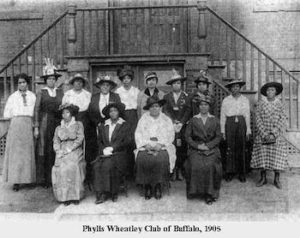
Phillis Wheatley Club, Buffalo, NY
*On this date in 1895, we affirm The Phyllis Wheatley Club. The Phillis Wheatley Clubs are women's clubs created by Blacks after Reconstruction.
The first club was founded in Nashville, Tennessee; some clubs are still active. The purpose of Phyllis Wheatley Clubs varied from area to area, although most were involved in the community and personal improvement. Some clubs helped in desegregation and voting rights efforts. The clubs were named after the poet Phyllis Wheatley. Phyllis Wheatley Clubs worked on improving their neighborhoods and the lives of people in their communities. Clubs were also involved in social reform.
The New Orleans club, founded by Sylvanie Francoz Williams, opened a kindergarten and daycare for working women. The club was also involved in black women's suffrage, and they founded the only training hospital for Black doctors and nurses in 1896. The hospital was initially named the Phyllis Wheatley Sanitarium and Training Hospital for Nurses. The Chicago club created a home for young women without permanent housing and emphasized Black literature. The club in Nashville, Tennessee, purchased a home for older women in 1925. The Billings, Montana, club was instrumental in helping desegregate the city. The Billings club also sponsored scholarships for young women.
Clubs, such as the Phyllis Wheatley Progressive Club in Pennsylvania, opened a night school in the late 1920s. Some clubs also emphasized continued learning. Clubs also donated books in celebration of Black History Month to public libraries. Atlanta's club helped build a reading room named after Phyllis Wheatley. In Buffalo, the Phillis Wheatley Club there celebrated the 30th anniversary of the ending of slavery with a play that they sponsored. The Racine, Wisconsin 1921 club brought Maud Cuney Hare and William H. Richardson to perform to show off Black talent.
The Charleston, North Carolina, club hosted events featuring prominent individuals in the Black community, such as Marian Anderson, Mary McCleod Bethune, Countee Cullen, W.E.B. DuBois, and Langston Hughes. The club in Coshocton, Ohio, also promoted Black figures in history, creating a program that featured individuals and inviting other clubs to attend the event annually. The clubs held fundraisers. These could be in balls or dances or theater and musical receptions. In Tampa Bay, the Phyllis Wheatley Club sponsored an annual "Defense Dance," which raised money by charging a fee at the door.
Fundraising could go towards other non-profit groups, such as the NAACP. Clubs could be affiliated with the YWCA or work independently. The first club started in Nashville and became affiliated with the National Federation of Colored Women's Clubs (NFCWC) in 1897, as was the Fort Worth Phyllis Wheatley Club, which was also affiliated with the NFCWC. Early club members were normally professional women or married to "prominent men in the community." However, some Phyllis Wheatley Clubs were made up of younger members or had members of many different cultures. Clubs were named for the poet Phyllis Wheatley. Many clubs have been and are still active into the 21st century. The El Paso, Texas Phillis Wheatley Club celebrated its 90th anniversary in 2005.